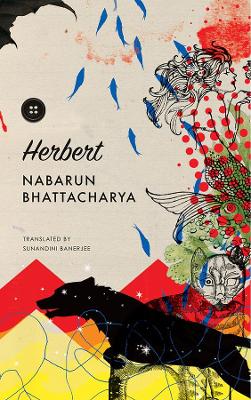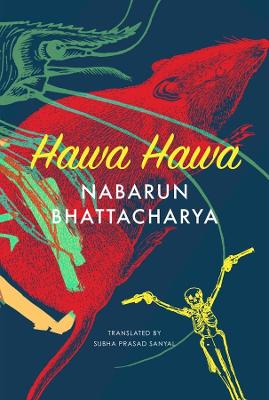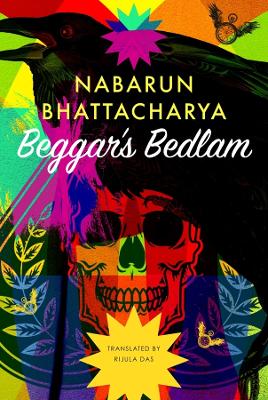India List
4 total works
May 1992. In Russia, Boris Yeltsin is showing millions of communists the spectre of capitalism. Yugoslavia is disintegrating. United Germany is uncertain about their next move, and communism is collapsing all around. And in a corner of old Calcutta, Herbert Sarkar, sole proprietor of a company that delivers messages from the dead, decides to give up the ghost. Decides to give up his aunt and uncle, his friends and foes, his fondness for kites, his aching heart that broke for Buki, his top terrace from where he stared up at the sky, his Ulster overcoat with buttons like big black medals, his notebook full of poems, his Park Street every evening when the sun goes down, his memory of a Russian girl running across the great black earth as the soldiers lift their guns and get ready to fire, his fairy who beat her wings against his window and filled his room with blue light . . .
Now in a new translation, Herbert, the beloved cult favourite by Nabarun Bhattacharya, and winner of the 1997 Sahitya Akademi Award, is a 'scathingly satiric, wildly energetic, and yet depply tender' portrayal of a doomed young man and a city struggling to resist forces that, alas, prove to be entirely beyond their control.
Praise for Herbert
'This first U.S. publication brings off a remarkable resurrection, one that erupts full-blooded, alive with laughter, stink and rage.'
- John Domini, Washington Post
'Swift and strange, [Herbert] tells the story of its titular character, an orphan whose life is characterized by loss and longing: a sweeping view of the richness and the turmoil of Bengali culture, literature, and politics in the twentieth century.'
- New Yorker
'[Sunandini] Banerjee's acrobatic translation is both enormously fun and true to the radical content. The writing disrupts the hegemony of the English language from the inside by celebrating the multilingualism possible within it.'
- Asymptote
'Nimble and vivid, Bhattacharya's slippery narrative slithers forward and sideways through time: an acute, idiosyncratic reading experience.'
- Publishers Weekly
'What is needed [now] is a kind of novel that attends to how society is being organized by certain vested interests; a novel that goes to the heart-rather, goes for the jugular-of the economic system itself. [Herbert] is prophetic of this tradition to come.'
- Ratik Asokan, 4Columns
'[Herbert] reads like Rainer Maria Rilke's Notebooks of Malte Laurids Brigge set in Calcutta. Featuring a young man with an open channel to the dead who drinks and grieves to excess, it is a mosaic of manic and immersive episodes. It is a spinning drunken stumble through a city that feels menacingly sensual.'
- Nate McNamara, LitHub
In this wildly inventive collection of Nabarun Bhattacharya’s stories, we meet characters such as a trigger-happy cop in an authoritarian police state, a man who holds on to a piece of rope from a deadly noose, a retired revolutionary thrilled by delusions of grandeur, and people working for a corporation that arranges lavish suicides for a price. Ranging from scathing satires of society to surreal investigations of violence and love, these stories are also a window onto the political and social climate in Bengal, tracing both pan-Indian developments like the 1975 Emergency and local ones like militant-leftist Naxalism and the decades-long Communist reign in the state. Expertly translated from the Bengali, Hawa Hawa and Other Stories is a journey through the mind of one of the most daring countercultural writers of India, one with particular resonance in these chaotic times.
Beggar’s Bedlam is a surreal novel that unleashes the chaos of the carnival on the familiar. Part literary descendent of Bulgakov’s The Master and Margarita and part a reconstruction of lost Bengali history, Nabarun Bhattacharya’s masterpiece is a jubilant, fizzing wire of subaltern anarchy and insurrection.
Marshall Bhodi Sarkar and his lieutenant Sarkhel surreptitiously dig on the banks of the Ganges River looking for crude oil reserves. Instead, they unearth curved daggers, rusty broadswords, and a Portuguese cannon. Bhodi is an occasional military man and the lead sorcerer of the secret black-magic sect named Choktar. He joins forces with the flying Flaperoos—men with a predilection for alcohol and petty vandalism—to declare outright war against the Marxist–Leninist West Bengal government. In a bloodless revolution that is fascinating in its utter implausibility, a motley crew of yet more implausible characters come together in a magic-realist fictional remapping of Calcutta.



